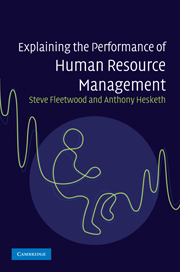Book contents
- Frontmatter
- Dedication
- Contents
- List of figures
- List of tables
- Preface
- Acknowledgements
- Part I HRM and organisational performance today
- 1 Crisis? What crisis?
- 2 Tracking the emergence of the HRM–P link paradigm
- Part II Meta-theorising the HRM–P link
- Part III Reflexive performance
- Notes
- Bibliography
- Index
1 - Crisis? What crisis?
Published online by Cambridge University Press: 05 July 2014
- Frontmatter
- Dedication
- Contents
- List of figures
- List of tables
- Preface
- Acknowledgements
- Part I HRM and organisational performance today
- 1 Crisis? What crisis?
- 2 Tracking the emergence of the HRM–P link paradigm
- Part II Meta-theorising the HRM–P link
- Part III Reflexive performance
- Notes
- Bibliography
- Index
Summary
Every HR professional should be able to pass this one-question exam: how does your work add value to this business in economic terms?
(Ulrich 1997: 246)HR has become an answer to a very important question, how can we improve a firm’s financial performance?
(Becker and Huselid 2006: 907)Let’s face it. After close to 20 years of hopeful rhetoric about becoming ‘strategic partners’ with a ‘seat at the table’ where the business decisions that matter are made, most human-resources professionals aren’t nearly there. They have no seat, and the table is locked inside a conference room to which they have no key. HR people are, for most practical purposes, neither strategic nor leaders.
(Hammond 2005: 40)These are heady days for the human resources department. Consider for a moment the magnitude of the debates over the war for talent, human capital management, intellectual capital and the centrality of intangibles in accounting for the competitive advantage of organisations, and you are left nothing short of awe-struck as to the commercial importance of the human resources (HR) department. Surely now we can claim HR is finally at the boardroom table and not on it, to paraphrase one of the leading publications of the now burgeoning field of measuring the link between HR and organisation performance – something we refer to as the HRM–P link (Becker et al. 2001)?
A decade after Ulrich’s ‘Bloody Question’ at the beginning of Human Resource Champions (1997: 1), namely, ‘should we do away with HR?’, the HR department appears to have moved backwards in its bid for corporate recognition. The big-hitting business guru writers appear to agree. Rosebeth Moss Kanter has recently predicted ‘the demise of the HR function’ (Moss Kanter 2003: xi), merely bringing to organisational fruition the warning sounded by Jeffrey Pfeffer over a decade ago in which he warned the HR function was ‘entering a game where winning is unlikely and playing by the rules set by others exposes human resource professionals to the possibility of at best short-term victories and long-term problems’ (1997: 357).
- Type
- Chapter
- Information
- Publisher: Cambridge University PressPrint publication year: 2010



